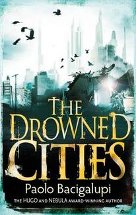The drowned cities by Paolo Bacigalupi

Atom, 2012. ISBN 9781907411113.
(Age 14+) Highly recommended. A companion volume to the award
winning Ship breaker, sees two damaged children, Mahlia and
Mouse, trying to survive in the dystopian world where warring
factions are fighting for the scrap that is left of cities that have
been overtaken by rising sea levels. Mahlia is the daughter of a
drowned city woman and a Chinese peacekeeper, and when the
peacekeepers left, she was abandoned and made an outcast as a
collaborator. Captured by The Army of God, whose soldiers cut her
hand off, she is rescued by a young boy Mouse and together they
escape to a village. Fate overtakes them again, when soldiers come
searching for Tool, the half-man who has been genetically designed
as a weapon of war. When the soldiers take off Mouse, Mahlia has to
face the heartbreaking decision about whether to try and find him or
save herself.
I had to put this down a couple of times as the stark reality of war
and boy soldiers made me feel devastated, but this is an outstanding
book that can be read without reading the first award winning, Ship
Breaker. I think what made me most disturbed but what also
makes this book so life changing is the portrayal of boy soldiers
that Bacigalupi makes. As a reader I was horrified at the behaviour
of the soldiers, thinking that they were adults. Gradually the
reader begins to learn that they are in fact children, the second in
command, probably in his mid to late teens and that they have all
been abandoned and only have their soldier companions as family. The
rituals that they go through to become part of the military group,
the brainwashing about why they are told to act the way they do and
the sheer brutality is heart rending.
This is also a tense, suspenseful book as Mahlia and Tool journey
through the forests and through the waterways of the drowned city in
search of Mouse. The descriptions of what could be Washington; its
streets now canals and its treasures looted are really vivid.
However it is the moral dilemmas that stay in the mind after reading
The drowned cities. The reader knows that there are boy
soldiers and similar situations happening right now in the world,
that peacekeepers have been forced to leave war torn countries and
that everyday some young person is probably faced with the dilemma
of saving themselves or looking after people they love.
An uncompromising, breathtaking book, The drowned cities
changed the way I think. It is not for the faint hearted but I
believe that it is a really important book for all libraries to have
and promote and would be an excellent class set or literature circle
book.
Pat Pledger